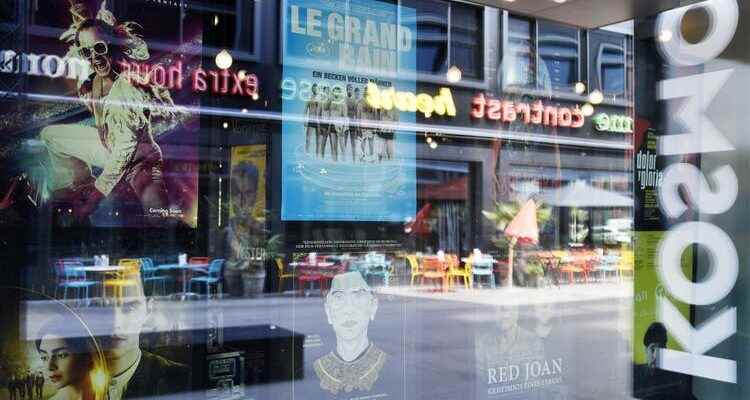The bankruptcy of the Zurich cultural institution is a mystery. A look at the contradictions in which the project was entangled is illuminating.
Book and cinema as such have survived. But not the Zurich place that should have brought both together: the Kosmos culture center on Europaallee.
Does Zurich, blessed with around seventy screens, need another cinema, does the sprawling gastronomic landscape need another restaurant, and does the urban public need a new place for readings and debates? That doesn’t seem necessary in this city, where being spoiled for choice is a greater evil than deprivation. That’s probably what many people thought when the Kosmos culture center opened on Europaallee in autumn 2017.
At the same time, curiosity is high. And the initiators, who call themselves cosmonauts, emphasize the added value. It won’t just be another cinema, another pub, another stage, they say, the interaction goes beyond the individual parts: the 62-year-old filmmaker Samir raves about the inauguration of an “intellectually oriented meeting place in the city”, his 67-year-old Co-founder Bruno Deckert of a place “where intensity and relaxation are balanced”.
subject of a doctoral thesis
The latter may sound like a slogan for a spa, but a 400-page treatise takes it to another intellectual level: Deckert wrote it in 2015 under the title “The discovery of the cosmos – autoethnography of an urban intervention” to obtain a doctorate in economics at the Submitted to the University of St. Gallen. It describes the intricate paths of this «space project of the third kind».
When the “cosmos” becomes reality, its appearance is impressive, whether you like the architecture or not. Many are even excited about it. Maybe this city of a thousand options has been waiting for something like this after all! Maybe it’s even a secret weapon against the ailments of the cinema industry? Even the book salon is often well frequented (although one wonders whether the students hanging around there are willing enough to make a contribution to the survival of this offer). In any case, the house becomes a magnet, and by no means only for members of the left-leaning culture cake.
But now it’s time to switch to the past tense. Because this house was once, as they say in fairy tales.
“We believe that the book, like the cinema, will survive in a contemporary form that requires development,” Deckert said at the opening. Book and cinema as such have survived. But not the place that should have brought both together, laudably without public cultural subsidies. One catches oneself thinking whether the “cosmos” was basically nothing more than its individual parts, which others had already tried to combine: a restaurant with a bar, plus a bookshop, and a cinema. And was the project, the construction costs of which had doubled over time, too grandiose?
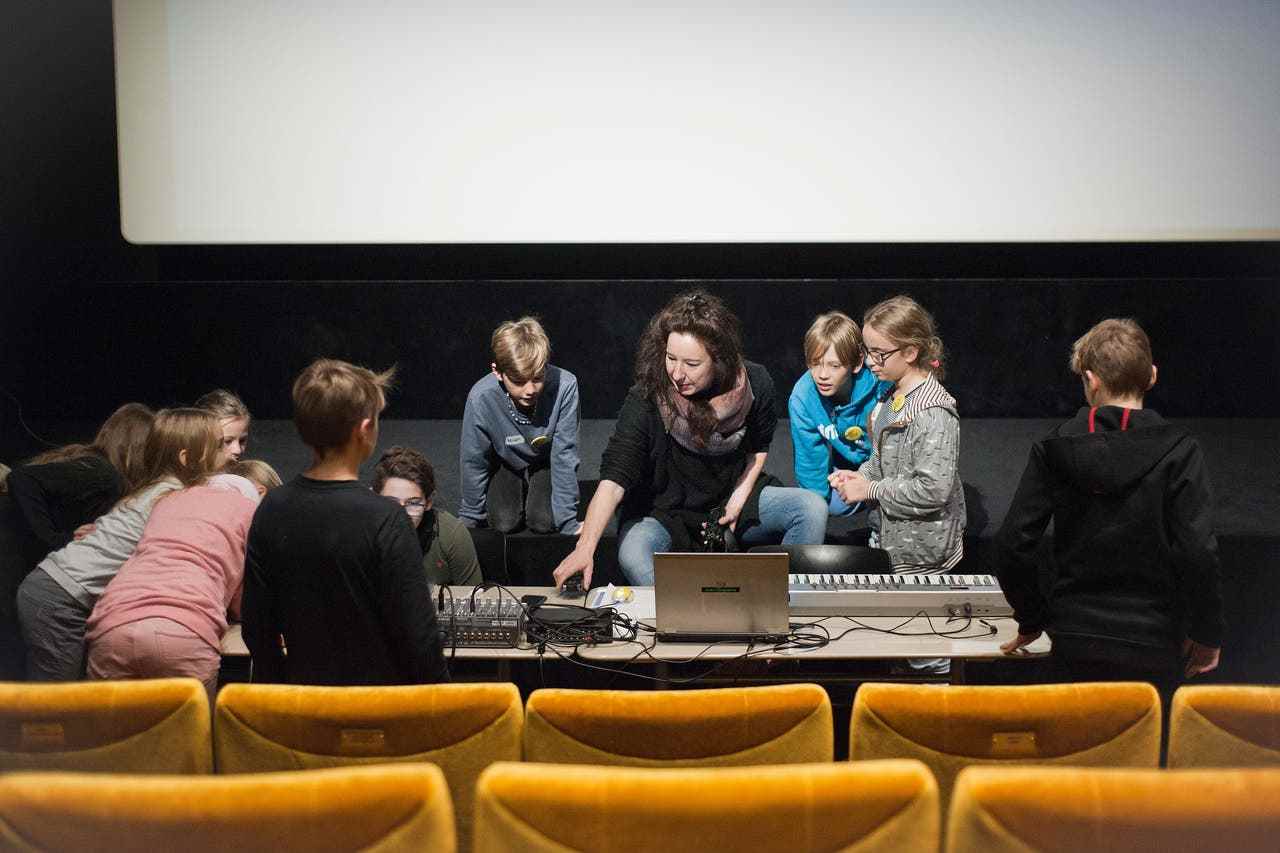
The cosmos as a magnet for young and old: 1200 schoolchildren deal with the filming of stories.
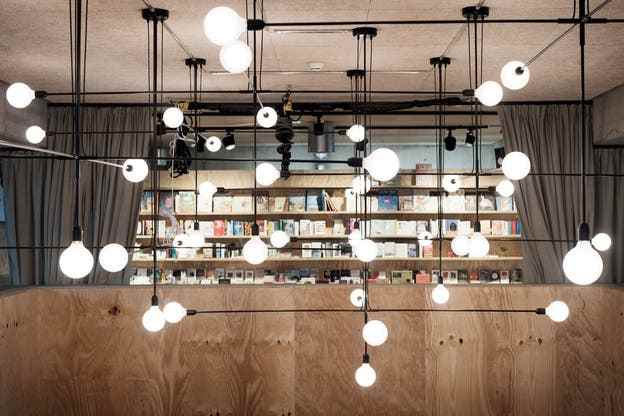
Lamp installation above the Forum stairs.
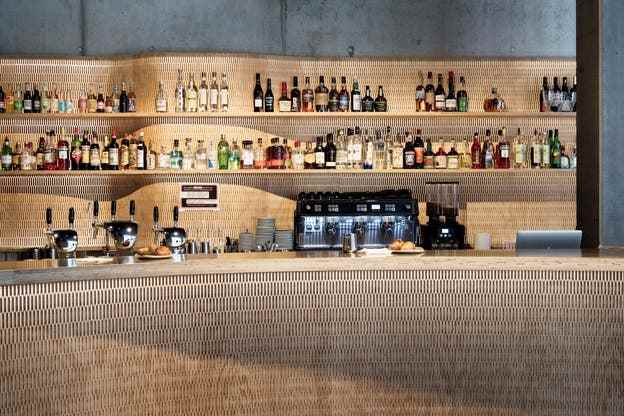
The curved bar in the cosmopolitan meeting place.
Picture above: Literary Film Days at the Kosmos Cultural Center. Around 1,200 middle school students in Zurich are involved in the filming of stories and become active themselves. Picture left: Lamp installation above the Forum stairs. picture right: curved bar.
Well, if you want to attract attention in this city, you won’t get far with spills – especially in the environment of the structural gigantism of the Europaallee. So the name already pointed to infinity: «Kosmos», without the «micro» in front of it. Deckert had planned his original project with the working title “Money and Mind” much more modestly. The cinema involved with the addition of Samir then made the project far more complex and risky. So risky that experienced industry people dismissed potential partners in advance: They came to the conclusion that something like this could not work out mathematically without more potent patronage or state cultural funds.
The impressed visitor of this house did not want to burden himself with such gloomy thoughts, even if he was the only guest in the cinema several times. Many, including us observers in the media, simply wanted to believe that this shot would succeed. He seemed to be making a dream come true: reconciling seemingly irreconcilable opposites.
On 5000 square meters, the Züri-typical impeccability of the processes should be combined with a little friction, which is needed for good art. It was not foreseen that there would be more friction than is good for the marriage of money and spirit. But that’s exactly what happened, and that has a lot to do with the opposites I mentioned: They don’t just attract, they also collide.
The bare facts
The house built bridges between Chreis Cheib and Bahnhofstrasse, between local bohème and the international workforce of Europaallee’s main tenant Google, between niche films and blockbusters. The contrast between lofty ideals and the bare facts of market requirements was probably central and ultimately fatal. And here the ideological pressure was particularly high. One hears from people whose call for monetization of the event program was met with the accusation that they had no heart for culture. Repayments and write-offs were put on the back burner, holes plugged with loans from friends.
The SBB were accommodating partners, but their participation in this manned space flight was not nurtured by a love of culture: they needed a goodwill campaign for their prestigious Europaallee, which had come under increasing pressure due to a lack of life and charm. Right from the start, left-wing circles suspected the “cosmos” of merely acting as a fig leaf. The Alternative List put up fierce resistance to the planning of Europaallee, and Samir himself, a member of this party, described the growing district as the nail in the coffin of District 4’s gentrification. He now tried to save himself by pointing out that without this cultural center this area would have degenerated into a shopping mile. And he advised the Revolutionary Construction, which protested against the “cosmos” with an act of vandalism, to come to terms with certain realities.
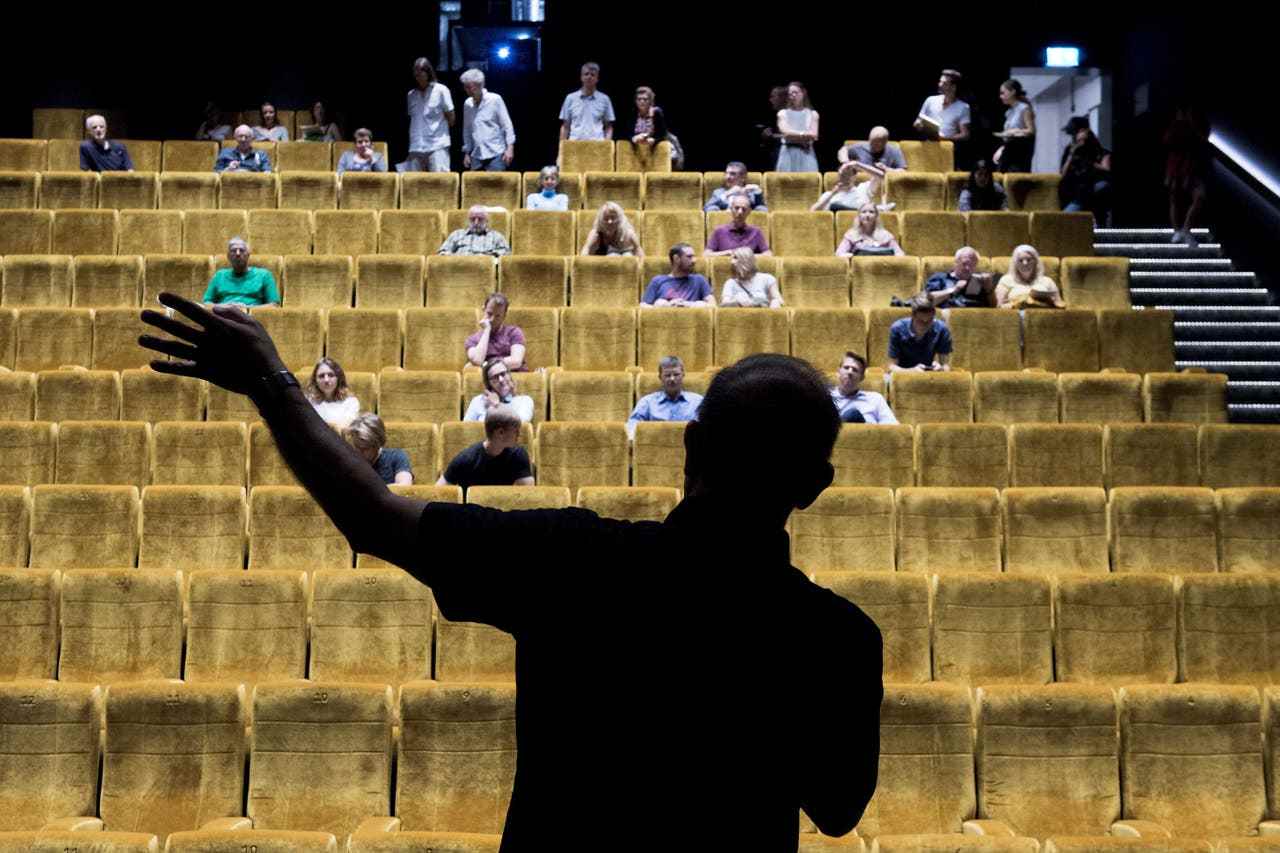
Samir speaks to journalists in 2017 before the opening of the Kosmos cinema. He announces the multi-sector building as an “intellectually oriented meeting place in the city”.
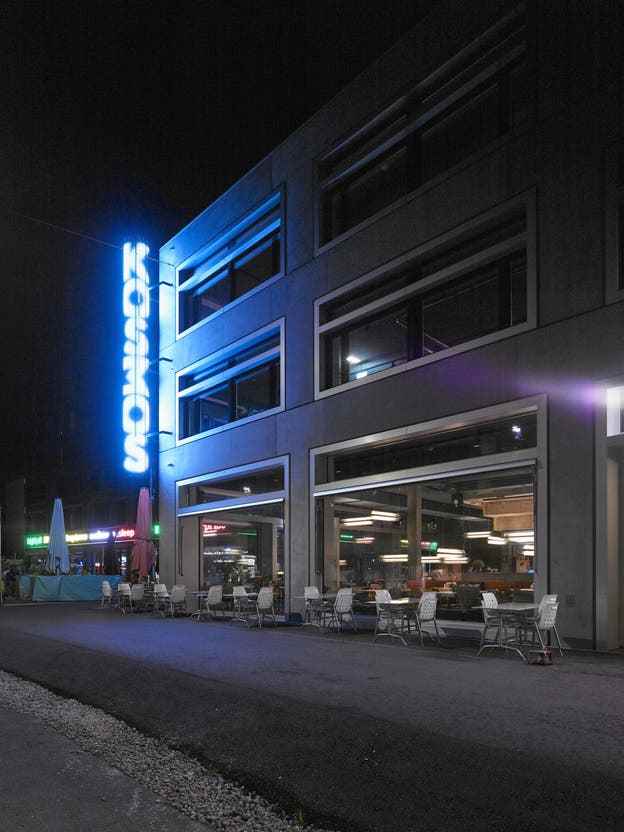
The Culture House at night.
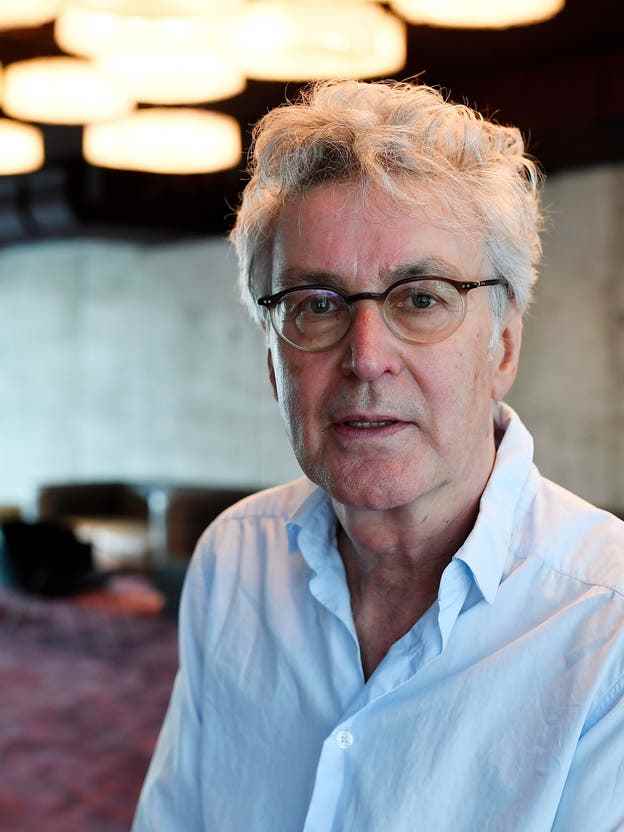
Bruno Deckert describes Kosmos 2017 as a place “where intensity and relaxation are balanced”.
Picture above: Samir speaks to media workers in the cinema. Picture left: the cultural center illuminated at night. Picture right: Bruno Deckert submitted a doctoral thesis to the University of St. Gallen in 2015 entitled “The discovery of the cosmos – autoethnography of an urban intervention”.
The filmmaker is a master storyteller, you can imagine how he also directed when conspiracy theories were sown. They fell on fertile ground with that part of the clientele who had long painted the devil of the “cosmos” on the wall as a temple to culture and consumption. In 2019, the tale of the planned takeover by right-wing forces began to circulate, with the help of some media such as the “Republic”, which a stone’s throw from the “Cosmos” had once started with a promise that was never really kept to reinvent journalism.
According to Deckert’s dissertation, such projects in the field of conflicting interests “always also represent a political intervention and can be read as political statements”. In any case, the conflict over the orientation culminated in one of the most abstruse chapters in the short history of this house: the alleged attack from the right was to be prevented under the battle cry “Reclaim the Kosmos”. This action basically confirmed that the project was ideological. Whereby one can find in retrospect that a little more bourgeois financial competence could not have harmed the house.
The quarrel led to a definitive break in the lead, which could hardly be repaired. The pronounced ego of the charismatic Samir, who can be as charming as he is rude, undoubtedly smashed most of the dishes. However, identifying him as the sole culprit would not go far enough. In this context, the balancing act that Deckert’s doctoral thesis shows proved fatal: In such urban projects, as it says there, actors and initiators find themselves in a double role – as sender and addressee at the same time, as producers and consumers.
It was only in this constellation that the contrast between the protagonists and their respective camp could unfold its destructive power and public impact. The drama would provide material for the screen, for a novel, for the stage – that is, for all the vessels that this cultural center offered. Phrases like “bang in the cosmos” or “squabble in the cosmos” developed into common alliteration in the headlines. And at some point bored observers turned away from this soap – until the last big bang came.
The crash landing of a belief
Now people are poking around in the bankruptcy estate, which – from the stove to the cinema seats – is largely owned by the SBB. Crocodile tears flow, the loss for the cultural city of Zurich is lamented. Some pour malice on the initiators, others insist on sympathy for the dismissed employees. When discussing what could become of the house, however, office space and apartments are mentioned, and some see the cinemas as lecture rooms in the future. You yawn and send wishes to heaven, towards the cosmos. May the failure of this ambitious project not paralyze the motivation of other private individuals to set up something daring.
The end of the “cosmos” may also be a crash landing of the belief that apparently irreconcilable opposites could come together. But it wasn’t the boldness of the idea that put an end to this space travel. Rather, there was a lack of willingness to bring this idea to the ground.
